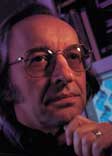 DNA repair shop The body is a marvelous, hard-working machine. Every day, every second, the two billion or so cells in your body are busy replicating, dividing and dying. This series of carefully synchronized steps starts with each cell making a copy of its DNA, the master molecule that encodes the genetic script of life. If a cell makes a mistake in replication, enzymes move in to call a halt to the process until the damage can be repaired. If the cell is too badly damaged, other enzymes trigger a signal that makes the cell commit suicide. Usually. But along the way, some DNA damage stays put and gets transmitted to future copies that the cell makes of itself. With the right - or wrong - collection of environmental and genetic influences, the long process of cancer begins. At the first sign of DNA damage, long before the bad copies become malignant, researchers like Stephen Kowalczykowski are studying them. A professor of microbiology at UC Davis, Kowalczykowski is interested in how proteins interact with DNA to make repairs. It's a crucial scientific question and one with implications for a host of human diseases, including cancer. Many cancers are caused by a type of DNA rearrangement called a translocation, in which a piece of genetic code moves from its normal position on the chromosome to another location. If the DNA segment moves in front of a gene, it can make the gene become inappropriately activated, either "turned off" or "turned on." This is bad news if the gene that's altered has something to do with making cells grow or not die when they're supposed to, two steps necessary for carcinogenesis.
Home |
Table of Contents |
To our Readers |
Building on Basics UC Davis Health System | © 2000, 2001, 2002 UC Regents. All rights reserved. |
Stephen
Kowalczy- |

